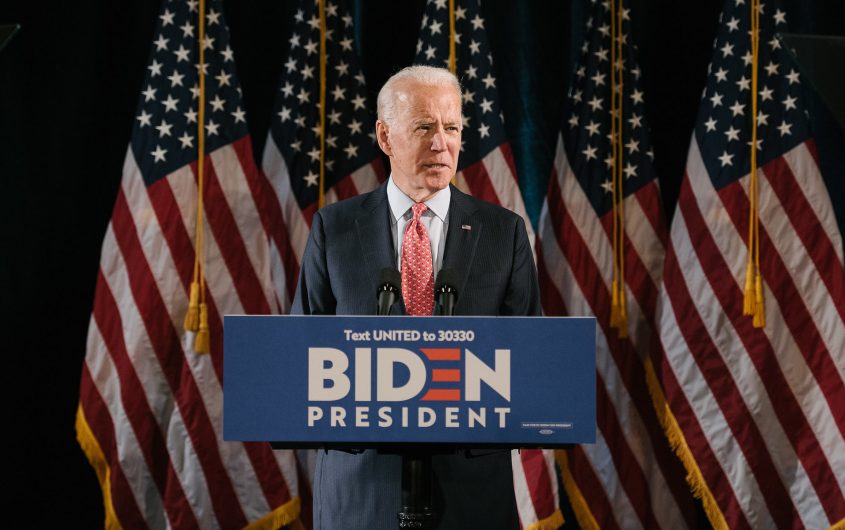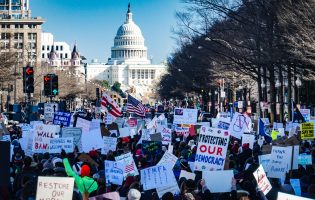
Photo News via Flickr
AGI Asks: What to Expect from the Biden Administration?

Jörn Quitzau
Bergos AG
Joern Quitzau is a Geoeconomics Non-Resident Senior Fellow at AGI. He is Chief Economist at Bergos, a private bank based in Switzerland. He specializes in economic trend research and economic policy. Joern Quitzau hosts two Economics podcasts.
Prior to his position at Bergos, Joern Quitzau worked for Berenberg in Hamburg (2007-2024) and Deutsche Bank Research in Frankfurt (2000-2006) with a special focus on tax and fiscal policy.
Dr. Quitzau (PhD, University of Hamburg) was a Visiting Fellow at AGI in April 2014 and September 2022 and an American-German Situation Room Fellow in April 2018.

Marianne Schneider-Petsinger
Chatham House
Marianne Schneider-Petsinger is geoeconomics fellow in the US and Americas Programme at Chatham House, responsible for analysis at the nexus of political and economic issues. Before joining Chatham House, she managed the Transatlantic Consumer Dialogue – an international membership body representing consumer organizations in the EU and US. She also worked on transatlantic economic issues at the American Institute for Contemporary German Studies (AICGS) in Washington, DC and at the Ministry of Economic Affairs in the German state of Thuringia. Her research interest lies in the area of trade and transatlantic economic cooperation. Marianne completed her graduate studies focusing on international trade and finance at the Fletcher School of Law and Diplomacy (Tufts University) and the John F Kennedy School (Harvard University). She holds a BA in International Affairs and Economics from the University of Maine. Marianne is originally from Germany and spent almost ten years in the US. She is now based in London.
She is a 2016-2017 participant in AICGS’ project “A German-American Dialogue of the Next Generation: Global Responsibility, Joint Engagement,” sponsored by the Transatlantik-Programm der Bundesrepublik Deutschland aus Mitteln des European Recovery Program (ERP) des Bundesministeriums für Wirtschaft und Energie (BMWi).

Sonja Thielges
Institute for Advanced Sustainability Studies
Sonja Thielges is a Geoeconomics Non-Resident Fellow and was a DAAD/AICGS Research Fellow from mid-March to mid-May 2019 and explored foreign policy interests in Germany and the U.S. related to the countries’ energy transitions. In Germany, she is a senior research associate in the project “Pathways to Sustainable Energy” at the Institute for Advanced Sustainability Studies (IASS) in Potsdam. Sonja’s research interests include the international dimension of the energy transition, foreign energy policy, the G20 energy agenda, as well as U.S. energy and climate policy. Her research has been published in studies, policy papers, online blogs, and academic publications.
Prior to IASS, Sonja worked in the Americas Division at the German Institute for International and Security Affairs (SWP) in Berlin, focusing on U.S. climate and energy policy. She was a visiting researcher at the University of Michigan’s Center for Local, State, and Urban Policy in Ann Arbor in 2014 and previously also worked on projects at the Environmental Policy Research Centre (FFU), the Institut für Europäische Politik (IEP) Berlin, and the Centre International de Formation Européenne (CIFE). In 2017/2018, Sonja was a participant in the AICGS project “A German-American Dialogue of the Next Generation: Global Responsibility, Joint Engagement,” sponsored by the Transatlantik-Programm der Bundesrepublik Deutschland aus Mitteln des European Recovery Program (ERP) des Bundesministeriums für Wirtschaft und Energie (BMWi). She completed an M.A. in North American Studies, Political Science, and Modern History at Freie Universität Berlin and Indiana University Bloomington and holds a PhD in political science from Freie Universität Berlin. Her PhD thesis studied climate policy discourses in the U.S. Rust Belt states.

Stephen Silvia
American University
Dr. Stephen Silvia is a Geoeconomics Non-Resident Senior Fellow at AICGS. He is a Professor of Economics in the School of International Service at American University, where he teaches international economics, international relations and comparative politics. He researches comparative labor employment relations, and comparative economic policy, with a focus on Germany and the United States.

Stormy-Annika Mildner
Executive Director, The Aspen Institute Germany
Stormy-Annika Mildner is the executive director at the Aspen Institute Germany and a Geoeconomics Non-Resident Senior Fellow at AICGS. She was Sherpa of the Business 20 (B20), the official Engagement Partner of the German G20 Presidency and Head of the External Economic Policy Department at the Federation of German Industries (BDI).

Tim Stuchtey
Brandenburg Institute for Society and Security
Dr. Tim H. Stuchtey is a Geoeconomics Non-Resident Senior Fellow at AICGS. He is the executive director of the Brandenburgisches Institut für Gesellschaft und Sicherheit (BIGS), a homeland security think-tank based in Potsdam, Germany. He is also a Non-Resident Fellow at AICGS and has served as Director of the Business & Economics Program. He works on various issues concerning economic policy, the economy of security, the classic German ‘Ordnungspolitik,’ and the economics of higher education.
Dr. Stuchtey studied economics with a major in international trade and international management and graduated in 1995 from the Westfälische Wilhelms-Universität in Münster. In 2001 he earned a Ph.D. from the Technische Universität Berlin in economics, which he obtained for his work in public finance and higher education policy. He worked as an economist for the German Employers Association and as a university administrator both at Technische and Humboldt-Universität Berlin. He was also the managing director for the Humboldt Institution on Transatlantic Issues, a Berlin-based think tank affiliated with Humboldt-Universität.
He has published a number of articles, working papers, and books on the security industry, homeland and cybersecurity issues, higher education governance and finance and on other questions of the so-called ‘Ordnungspolitik.’
AGI asks:
What are the one or two most important areas of economic, trade, financial, technology, public health, or climate policy where there is the greatest need for German-American or broader transatlantic cooperation during the next U.S. administration?
Leon Lieblang
University of Duisburg-Essen
The climate crisis is an international crises. In his Climate Plan, Mr. Biden has stated that he is willing to address the issue on national and international level. Rejoining the Paris Agreement can be approached immediately and will likely be one of the first projects of the new administration.
For further steps, German-American as well as a broader transatlantic cooperation is essential. This might include new multilateral environmental agreements as well as the further development of existing agreements for different sectors. Controversial subjects such as a EU carbon border tax or environmental standards are only some examples which require close coordination. Relying on a strong partnership, both the U.S. and Germany should use their potential as climate leaders to play a key role in forthcoming climate negotiations.
Stormy-Annika Mildner
Federation of German Industries
The new Administration’s focus during the next months will be on domestic policy issues like overcoming the pandemic and the economic downturn resulting from it. To help our crisis-ridden economies on both sides of the Atlantic, we should urgently release them of the additional burden that the ongoing trade disputes create, such as the Airbus/Boeing dispute: We finally need a negotiated solution. To get back on the growth track, it is also important that the United States abolishes the 232 tariffs on steel and aluminum so that the EU can also end its retaliatory measures. Imports from the EU do not threaten the national security of the United States—be it steel and aluminum, cars, mobile cranes, or electrical transformer components.
A broader trade agreement eliminating all industrial tariffs is unlikely to be achieved in the short term, but would highly benefit both the EU and the United States. The EU has proposed such an agreement to the United States and it should renew its proposal toward the new Administration. In addition, the EU also wants to achieve an agreement with the United States on regulatory cooperation and conformity assessment for industrial products in particular, which German and European industry very much support as well. The transatlantic partner should furthermore work on setting new and high transatlantic standards in areas such as artificial intelligence and international data flows.
Jörn Quitzau
Berenberg
In terms of economic, political, and cultural similarities, the USA and Germany (or Europe) are natural trading partners. The disputes of the recent past should be settled and instead the Transatlantic Trade and Investment Partnership (TTIP) should be renegotiated and concluded. In this way America and Europe would set important international standards.
On a more fundamental level, the United States and Europe should work together to discuss the right proportion of individual freedom and public spirit in a modern, liberal democracy. Both the Coronavirus pandemic and China’s autocratic system raise difficult, uncomfortable questions. A common transatlantic line would be highly desirable. To this end, an intensive dialogue is needed first—between the United States and Europe, but also within our respective societies.
Marianne Schneider-Petsinger
Chatham House
Addressing the COVID-19 pandemic and supporting the economic recovery are the urgent priorities for the U.S. and Europe. Greater transatlantic cooperation and efforts to strengthen supply chain resilience can play a key role in this regard. These steps could also help with reducing dependency on China-heavy supply chains.
Leveling the playing field with China will remain a key issue for the U.S. and Europe. In light of the many shared concerns regarding forced technology transfer, intellectual property theft, industrial subsidies, and the role of state-owned enterprises, greater transatlantic cooperation could generate more leverage in persuading China to change its policies and practices. At the same time, this raises the question of what the U.S., which is likely to put more emphasis on human rights issues under a Biden administration, would be asking of its partners. And to what degree would Germany—and Europe more broadly—be willing to “put skin in the game” and risk their commercial ties with China?
Finally, under a Biden administration, the U.S. and Europe could develop a shared and positive agenda for reforming the multilateral trade system and WTO—with a focus on fixing the dispute settlement system and modernizing the trade rules, for instance concerning digital trade and tackling industrial subsidies. But reform is not guaranteed as some of the U.S. concerns are longstanding. Moreover, joint efforts risk being undermined unless transatlantic trade tensions—such as over digital services taxes—are managed.
Stephen Silvia
American University
The tariff increases that the Trump administration implemented against China provide an opportunity to remake the trade relationship between China and the rest of the world. The next administration should work closely with the Europeans to negotiate for a comprehensive reform of Chinese trade, intellectual property, and state aid policies in exchange for eliminating the Trump tariffs. If Chinese authorities refuse to negotiate seriously or to offer meaningful reforms, European officials should threaten to match the U.S. tariff increases. This strategy would take an unprecedented degree of cooperation between the European Union and the United States. There is no guarantee that such a coordinated transatlantic carrot-and-stick approach would prove sufficient to move the Chinese to undertake substantial reform, but current circumstances provide the best opportunity to try since China joined the World Trade Organization two decades ago.
Tim Stuchtey
Brandenburg Institute for Society and Security
Where should I start other than by saying: all of the above.
Cooperation in the field of climate change will be needed to have a long-term effect. Most pressing is joint action to fight the health and economic impact of the COVID-19 pandemic. That includes a coordinated approach to vaccine and medical therapy development as well as access and allocation to them once they become available. It must also include coordinated action to get our economies rolling again by lowering trade barriers for goods and services and by putting an end to the Fed’s and ECB’s extraordinary monetary measures. A first step for more economic coordination should be the appointment of judges to the WTO court. On the technology front, and on my personal wish list, I hope the U.S. and Germany will start an initiative to establish a jointly funded EU-U.S. test center for 5G security.
Sonja Thielges
Institute for Advanced Sustainability Studies
From my perspective, in the area of climate policy, there is a great need to expand the existing U.S.-German Energy Dialogue. So far, this dialogue on sustainable energy and climate protection mostly takes place between the German government and subnational climate frontrunners such as California or the New England states. In the U.S., these important topics need to be tackled not only at the state level. It will be important for the Biden administration to get involved and to also invite U.S. states to the table that have, for various reasons, neglected climate protection so far. The transatlantic partners could use the existing communication channel of the U.S.-German Energy Dialogue as an opportunity to jointly address issues of sustainable energy transformation and discuss the many related challenges, including topics such as low-carbon innovations, carbon pricing and coal phase-out.








